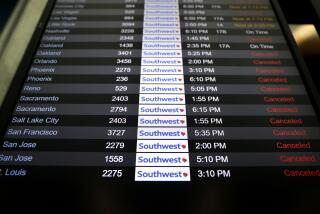Court Clears Cash-Wiring Settlement
- Share via
An appellate court has cleared the way for a settlement worth up to $400 million for people who sent money to Mexico through this country’s biggest wire transfer companies from 1987 to 1999.
Plaintiffs in three states had claimed the wire transfer companies--Western Union, Orlandi Valuta and MoneyGram--charged hidden and excessive fees to predominantly immigrant consumers, leading to a federal court settlement last year in which the companies agreed to give discount coupons to former customers.
The companies, which admitted no wrongdoing, also agreed to contribute $4.6 million to a community fund and disclose information on profits earned from foreign exchange rates.
But the settlement, which brings an end to all similar litigation nationwide, was delayed as attorneys for California plaintiffs filed an appeal. Among other points, they argued that the coupon deal did not adequately compensate consumers and that California plaintiffs would have a better shot at justice under California law.
The U.S. 7th Circuit Court of Appeals in Illinois dismissed those claims as having only “nuisance value” in a ruling last week, which was disclosed by attorneys Tuesday.
If all eligible consumers came forward to take advantage of the coupon offers, the discounts would amount to $400 million. But attorneys close to the deal say it is likely that just 10% of those coupons will be redeemed.
Los Angeles attorney Fred J. Kumetz, who spearheaded opposition to the settlement and filed the rejected appeal, said he and co-counsel are considering petitioning the U.S. Supreme Court to hear the case, because it has a big-dollar effect on so many consumers.
But the probability that the nation’s top court will take on the case “is very small,” he conceded.
Matthew J. Piers, a Chicago attorney who helped negotiate the national deal on behalf of immigrant plaintiffs, said the opponents had “run out of string.”
“I hope we can now move forward and implement the benefits to the class,” he said. “In terms of objections to the settlement, the court really strongly rejects all of them.”
Piers said the companies and lawyers who negotiated the deal will soon begin the grueling task of locating millions of often transient and in many cases undocumented immigrants across the country to get the coupons into their hands.
An estimated $7 billion a year in remittances flow to Mexico, sent predominantly by immigrants to family back home. Much of that comes from California.
As years have passed, the consumers entitled to the coupons have become harder to find. Thirteen million notices were sent in 1999 to customers who wired money during the dozen years covered by the settlement, giving them an opportunity to contest the deal. Fully 40% of those were returned because the addressee had moved with no forwarding information, Piers said.
Lawsuits against the money transfer giants were filed in California, Texas and Illinois beginning in 1997. At issue in the cases was the companies’ practice of earning substantial profits on the foreign exchange spread--the difference in the rate at which they buy and sell pesos--without disclosing that to consumers.
The cases focused on Mexico because the companies were believed to profit most from the spread on the Mexican peso, and U.S.-Mexico transfers made up the biggest slice of their business.
The Illinois attorneys--Piers among them--spearheaded the settlement, which won preliminary approval in May 1999 and final approval last December by a U.S. district judge in the Northern District of Illinois.
The settlement was widely criticized by Kumetz and some politicians and Latino community activists as too beneficial to the defendants because the discount coupons--one $6 coupon or two $4 coupons for each wire transfer--guarantee them repeat business.
Kumetz has filed a separate case in California Superior Court, arguing that existing California law bans the practice. He is representing immigrants here who opted out of the national deal or have wired money home since the fall of 1999.
But several courts--now including the 7th Circuit--have ruled that the legal claims were weak and the settlement likely the best deal consumers could expect to get.
The big three companies recently have charged $10 to $12 to wire $300 to Mexico, so the coupons represent a significant discount. But other competitors have stepped in to offer transfers for as little as $1. The public relations nightmare spawned by the lawsuits also has compelled more consumer-friendly tactics from First Data Corp.’s Western Union and Orlandi Valuta and Viad Corp.’s MoneyGram Payment Systems Inc.
Implementation of the settlement would help close one of the industry’s most divisive chapters.
“We are extremely pleased with the 7th Circuit’s very thoughtful and well-reasoned decision,” said Richard J. Grad, an attorney for Western Union and Orlandi Valuta. “This settlement . . . is a positive resolution of complex and expensive litigation and reaffirms the [companies’] commitment . . . to their customers.”
Any consumers who believe they have been left out of the settlement or want more information can call (888) 285-3607, Piers said.
More to Read
Sign up for Essential California
The most important California stories and recommendations in your inbox every morning.
You may occasionally receive promotional content from the Los Angeles Times.














